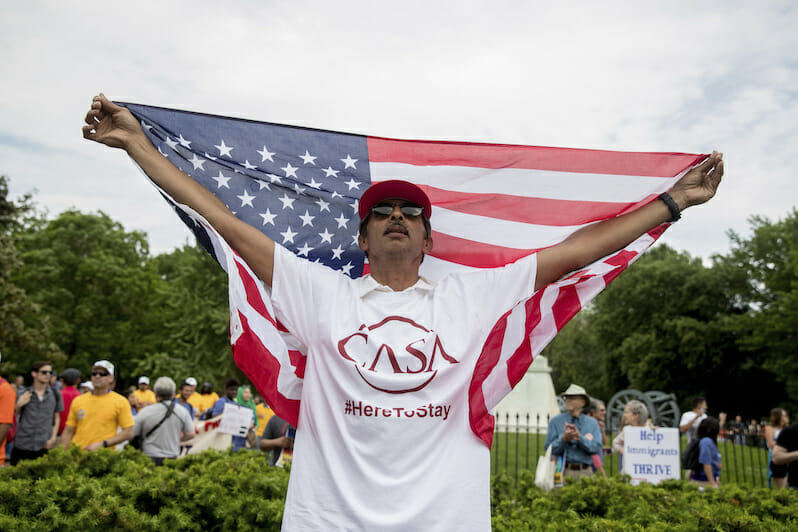Where Is the Outrage Over Anti-Immigrant Bills?
The “resistance” has been too compliant regarding two bills now before Congress. A demonstrator participates in a May Day protest outside the White House to denounce President Donald Trump's anti-immigrant policies. (Andrew Harnik / AP)
A demonstrator participates in a May Day protest outside the White House to denounce President Donald Trump's anti-immigrant policies. (Andrew Harnik / AP)
A demonstrator participates in a May Day protest outside the White House to denounce President Donald Trump’s anti-immigrant policies. (Andrew Harnik / AP)
While many of us are rightfully angry over Donald Trump’s treatment of the media, over the GOP’s attempt to gut health care for millions of Americans and over myriad other issues, two little-noticed but impactful bills sailed through the House of Representatives last week with barely a peep from progressive voices. The bills were the first immigration-related pieces of legislation taken up by the House since Trump’s inauguration and apply harsh penalties for undocumented people. They also help the president live up to some of his most xenophobic rhetoric and were passed with little or no debate, even receiving some Democratic support. They now head to the Senate, and unless there is a major public outcry, the bills could become law and fuel the hateful promises Trump made to the racist elements in his base.
Heidi Altman, director of policy at the National Immigrant Justice Center, explained to me in an interview that “we saw the same sort of procedural shenanigans happening with the health care act.” She added that when it came to the immigration bills, there was hardly any outrage from either Democrats or the public. “These bills were introduced, and then they were rushed to the floor of the House, and so that stripped us of the opportunity to weigh in in a meaningful way,” she said.
One of the two bills is named Kate’s Law, after Kathryn Steinle, a young, telegenic, white American woman who was killed in San Francisco in 2015 after a bullet fired from a stolen gun ricocheted off the sidewalk and struck her in the back. The man accused of shooting the gun, Juan Francisco Lopez-Sanchez, happened to be undocumented—a factor that gave candidate Trump just the fodder he was looking for to target “sanctuary cities” like San Francisco and scapegoat immigrants as violent criminals. Yes, Lopez-Sanchez had been convicted of multiple felonies on narcotics-related charges (rather than violent crimes), but apparently it did not matter that the bullet that tragically ended Steinle’s life was an accidental ricochet off the sidewalk. According to The Los Angeles Times:
Lopez-Sanchez told KGO-TV that he found a gun wrapped in a T-shirt on the ground near a bench that evening and that it accidentally fired three times when he touched it. He said he kicked the gun off the pier and walked away, unaware anyone had been shot.
Had the fatal shot been fired by a citizen, there would have been no attempt to make a martyr of Steinle and politicize her death. Indeed, a judge dismissed Steinle’s parents’ suit against the city of San Francisco for being a “sanctuary city,” but allowed their case against the Bureau of Land Management (BLM) to go forward, given that the gun in question was left unsecured by a BLM federal officer in an unattended car.
Trump has repeatedly made unsubstantiated claims of mass violence by immigrants in the U.S. Last October, just days before the election, he said at a rally in Springfield, Ohio, that “[t]housands of Americans have been killed by illegal immigrants,” leaving out context, time period and more. He might as well have said, “Thousands of Americans have been killed by toddlers,” which would be just as true. As McClatchy pointed out, a case Trump often cited last year was that of a legal refugee from Vietnam who had shot a police officer in California 26 years earlier. That officer later died—of cancer—12 years after the incident. If Trump can point only to cases such as this and to the accidental shooting of Steinle, then his claims of violence from undocumented immigrants are deceptive at best and blatantly xenophobic at worst.
Referring to Steinle’s death, Altman said, “That case and a few others are being used in a way that I find very manipulative of the victims, to put forward an anti-immigrant agenda.” That agenda is clear: to enlist local police in federal immigration enforcement activities and engage in mass detention and deportation. Already under Trump, Immigration and Customs Enforcement (ICE) agents are targeting sanctuary cities, as revealed earlier this year to CNN by an anonymous immigration official. According to the news report, “High-ranking ICE officials have discussed in internal meetings carrying out more raids on those locations,” and “a mid-February raid in the Austin metro area was done in retaliation for a local sheriff’s recent decision to limit her department’s cooperation with ICE.”
While Kate’s Law primarily enhances sentencing for multiple violations of immigration law, it ranges beyond that point. Altman cited another of the bill’s many provisions: “Anyone can be punished for up to 10 years in a federal prison for illegal entry if they have three prior misdemeanor convictions.” But, she explained, “there’s no statute of limitations,” and “those three misdemeanors could be offenses that are attendant to a person’s immigration status.” That means that an undocumented immigrant who has never committed a violent crime but has been cited three times for driving without a license in states where it is illegal to procure one could face 10 years in federal prison. What’s more, by refusing to let undocumented immigrants obtain driver’s licenses, states also jeopardize public safety. A study found that California’s decision to allow driver’s licenses for immigrants resulted in a significant drop in hit-and-run accidents.
The second bill the House passed complements Kate’s Law by expanding the definition of federal funds that cities using the label “sanctuary” could lose. The “No Sanctuary for Criminals” bill has been deemed unconstitutional by the ACLU and other groups, as it appears to violate the Fourth and Tenth amendments. But the bill goes even further, adding conditions that would affect would-be recipients of city funding. Altman explained that the bill “expands vastly the number of people that would be put into immigration jails and held there without any opportunity to have an individualized determination of whether it is proper for them to be detained.” In other words, it will contribute to the already disproportionate numbers of people, especially people of color, being incarcerated in the U.S. without due process or probable cause.
What Trump and the GOP fail to mention is that cooperation with federal agents makes all residents of the U.S. less safe. Altman said, “If you have a local jail that is regularly handing people over to ICE, then immigrants and their loved ones are not going to call 9-1-1. They’re not going to testify when they have been a witness to a crime.” Her logic is not hypothetical. Already there are drops in crime reporting coming from immigrant-heavy communities. This is bad for public safety overall, and we have Trump and the Republicans to thank for it.
But neither Democrats nor many progressives in the party’s base seem to care very much about these two immigration bills. A report in The Hill explained why 24 House Democrats voted for the bills—because “House Democratic leaders said they wouldn’t twist arms to get their members to oppose the legislation.” Unlike the discipline Democrats have shown on preserving the Affordable Care Act against Republican assault, the more liberal party seems willing to throw immigrant communities under the bus. Outside of immigrant rights organizations and civil rights groups, there has been little protest from major social justice groups. “It’s really disappointing,” Altman said of the lack of attention from liberals and progressives.
“This legislation goes hand-in-hand with a coordinated effort by the administration to paint all immigrants as criminal just by nature of their immigration status,” Altman said, “and that allows this administration to normalize their goal of mass detention and deportation of immigrants.”
The two anti-immigrant bills now head to the Senate, where at least three Democrats—West Virginia’s Joe Manchin III, North Dakota’s Heidi Heitkamp and Indiana’s Joe Donnelly—may join Republicans to pass them. The only thing standing in the way of a potentially bipartisan push to scapegoat immigrants is grass-roots pressure. Activists have successfully pushed back on many of Trump’s dangerous goals, and it is incumbent on the broad anti-Trump resistance movement to rally for the rights of immigrants, arguably the most vulnerable targets in the U.S.
Your support matters…Independent journalism is under threat and overshadowed by heavily funded mainstream media.
You can help level the playing field. Become a member.
Your tax-deductible contribution keeps us digging beneath the headlines to give you thought-provoking, investigative reporting and analysis that unearths what's really happening- without compromise.
Give today to support our courageous, independent journalists.



You need to be a supporter to comment.
There are currently no responses to this article.
Be the first to respond.